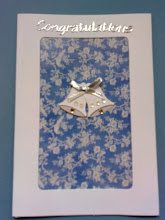I read something interesting today:
Education has a ripple effect… Educate a girl, and you educate her children and generations to follow. ~ John Wood in What Matters Now (free e-book here).
I think a lot of people would agree with this. It resonates with me on a very personal level though. For me education does not have a linear effect: a woman goes to school, she sees the value of education and sends her daughter to school, who then sends her own daughter to school. It absolutely has a ripple effect. I believe that the benefits don’t just get passed along; they ripple outward increasing and accumulating at each step.
Why do I think this? I know the value of education from a very personal perspective and from seeing the impact on those that don’t have it. My mum lost her mother at the age of two and so her education was never prioritised. She grew up in a time and place in Pakistan where women were not generally educated unless it was for a few early years – enough to read and write at a basic level. The older generation of men in our family did not approve of sending girls to school because it was a threat to the tight grip they kept over their womenfolk. They feared that educating their children would lead to women becoming independent, thinking for themselves and worse still making their own decisions – like choosing who they wanted to marry.
My mum came to England in the 1970’s and the impact of not being able to read or write either in her own language or in that of her adopted country affected her significantly. She could not write home and tell her family of her living conditions, she could not read letters from her beloved brother, who she did not see for 16 years at one point, unless she found a trusted friend to read them to her. She could not support her children in their education by helping them with their homework. Over time she learned to read and write a little English by watching children’s programmes with us and as we got older we would write letters to her brother for her.
The difficulties she faced meant she never wanted to see her daughters in the same position. i recall that when I was very small she kept a pretty black and gold mirrored bag on top of her wardrobe and whenever she picked up a children’s book she would stash it in this bag. She showed me her bag when I was about four and told me it was for when I went to infant school. Something about how special and important that bag was rubbed off on me and I have been a passionate bibliophile throughout my life. She made sure we always had what we needed for school and kept dropping hints that one of us should think about becoming a doctor (none of us have quite managed that …).
At the end of high school, my dad was very uncomfortable with me continuing my education - the idea of his oldest daughter going out into the wider world must have terrified him as would have the idea of the dangerous world out there influencing me. My mum was the one that supported me to continue into college and acted as a buffer between my ambition and my dad’s discomfort. When I was in college, Tony Blair did something that I will never forgive him for: introduce the payment of fees for university education. I decided that this meant I could not afford to go to university, so I would look for a job. My mum encouraged me to apply to university saying she would find a way to pay the fees – this coming from a woman who worked very long hours as a seamstress to earn sometimes less than £100 for a weeks work. Thankfully my dad grudgingly let me go to university – the first woman in my family to do so. I didn't have to pay the fees because the universities actually started to charge the year after and I found a part time job to pay for my books.
I will never forget the support my mum gave me to study and whenever I look at her arthritic hands caused by her years of working as a seamstress, I am reminded of why Muslims believe that paradise is under their mothers feet. I am reminded also of the sacrifices it can take to move outside of your comfort zone, create a new path and change what came before.
Again it was not just a case of a simple linear benefit – the fact that she could not read and I could. The ripple in my life was massive. I could enter the world of work and worked for the civil service and then local government. I read everything I could get my hands on and despite a sheltered life, felt as if I had seen so much in the world. New ways of thinking, being and living opened up to me that I could pick and choose from to implement in my life.
Now it is my turn to create the ripple in my children’s life. But it is not just a case of I received an education, I could get a job and now my children can. It’s not even about trying to get the best grades from the most prestigious schools. The ripple has the potential to run so much further and wider. For me it’s about opening up to the endless possibilities and experiences that are out there – the idea of following your passion and using it to serve the world, the idea of learning from everyone you meet and sharing what you learn, of thinking and acting big, of exploring the world. As an immigrant community, for so long we focussed on surviving, then fitting in, that we have not always had time for these strange, new ideas.
For my children I am making time for these ideas. I have chosen to opt out of the competition to see whose child gets the best grades or gets into the best school. I want to choose a wider definition of education for my children. I love to share new ideas and emerging thinking with them. I love to discuss world news and politics with them and I am surprised by their take on things sometimes. We watch TED talks and Islamic lectures together (recently we watched Mary Beards lecture how women are silenced in public life – I wonder what our old men would have made of that!).
As little lady gets older, I find her picking up some of my books instead of her own (which completely threw me out of my comfort zone at first). I am introducing her to spoken poetry and activism (check out Sarah Kay's If I should have a daughter and Rafeef Ziadah's Shades of anger and We teach life, sir, if you want to get a taste of this, you might end up hooked like we both are). I will encourage the children to volunteer in our neighbourhood once they hit their teens and I will try to find ways for them to travel and experience the world (if I can let go of my terror of allowing them out of my sight first). I want them to take the lead on what they want to educate themselves about and how they will be of service to their community and the wider world as they use what they learn. I yearn for them to be so much more than me, to soar in the world and to help those in difficulty at the same time.
Where will the ripple started by my mum end? Who knows who will be served by her sacrifice and dream and where it will take the generations to come.































Beautifully written. Educating a woman turns up the level of living of the entire community and society.
ReplyDeleteJazakh'Allah-khairun dear Sister, for always making the time to stop by and read.
DeleteBeautiful, and eloquent. Thank you so much for this simple and lovely piece.
ReplyDeleteSometimes I come across Muslims saying things like 'there's no need for women to go into higher education as a rule when they're all going to get married and stay home' and that the push for women's education is some sort of fallacy, that the idea of empowering women is 'feminist', that working mothers are inherently neglectful, and that pursuing anything other than direct housework in the home is just 'extra' to family work and somehow 'unIslamically taking women out of the home sphere where they belong'. Imagine!! In the 21st century, words like this coming from the people whose religion originally uplifted women so much!
Assalam-alaikam Sisteer Anony,
DeleteI grew up hearing such things from various people, some of whom have changed their tune over time.
Jazakh'Allah-khairun for taking the time to read
Bismillah.
ReplyDeleteEducation like so many other things in life can be good and bad. Just as medicines are, sports are, even some worships can be.
Education imparted through books, lectures and classrooms are intended to condition the student's thoughts to the writer's/teacher's way of thinking. And so, you can become a Kaafir making a permanent residence in the most pitiable of all places, the Hell, or a great Muslim: all through reading. Bibliophile Abdul Majid Daryabadi (d.1970s, India) became an apostate atheist when in his university days he saw a cruel-faced -- fake, of course -- picture of the holy Prophet sallallaahu alaihi wa sallam in the then holy Quran of Europe: Encyclopedia Britannica. (Now perhaps they have replaced their old holy book with Wikipedia.) Years later, he reverted to Islam when he read Seeratun Nabi by Shibli Noamaani, and went on to become the great Islamic writer and journalist, Maulana Abdul Majid Daryabadi.
Allah's Prophet sallallahu alaihi wa sallam has prayed for the beneficial knowledge and sought Allah's protection from the harmful knowledge. One of the category of knowledgeables, the poets and by extension, literateurs, has been specifically condemned in the holy Quran (26:224-226) The book obviously excludes the righteous poets from this condemnation. Examples would be Hazrat Hassaan bin Thabit, Allamah Iqbal, etc.
So, we have to tread with care in this field fraught with perils. Education and books are not all pure and white, milk and honey. While Ilme Naafi' should be encouraged, we should do our best to keep away from or to at least minimize our exposure to the non-Naafi' knowledge.
The highest category of Ilme Naaf' would be the books of and on Quran, Hadith, Fiqh, etc. Something related to your profession (medicine, computer, engineering etc.) or that which benefits you in day to day life would also come under Ilem Naafi'. If you intend to serve Allah's Deen through language, even Shakespeare's Satanic works could become Naafi'. But the reader must balance the poisons from the mainstream English literature through worship and through sufficient study of Islamic books. (I mention English here just because that would be the language for learning Satanic thoughts for most of us: readers of happymuslimah.com.)
If taken with precautions, education would be highly beneficial in this world and the Hereafter. Else, we must understand that the primary purpose for the establishment of schools and colleges is to ensure that people are able to reach Hell easily. Schools are not meant to guide but to misguide. People like you who have stayed good Muslims are not so because of education, but in spite of education. And being a good Muslim is the real and ultimate success with the highest paying remuneration and ensuring the everlasting accomplishment. Every other so-called success is comparatively worthless.
Accalaiming all knowledge without qualification and restriction can be misguiding and so it must be avoided.
Education, any form of education, must be encouraged. Your stance on education reminds me of the Taliban, sir.
Delete